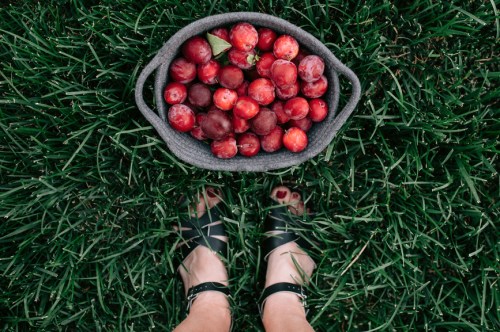4 Reasons a Dietitian Says You Should Be Adding Heart-Healthy Plums to Your Fruit Rotation Immediately
Here, a registered dietitian shares the key plum benefits for health, including how plums boost your digestion and combat inflammation.

IMHO, plums are among the biggest underdogs in the summer fruit world, which makes me feel the need to put on my PR hat and give them some well-deserved airtime. For starters, this summer fruit is all too often overshadowed by the likes of other warm-weather staples like watermelon, peaches, and cherries. Then, prunes (aka dried plums) tend to steal the spotlight over their juicy counterparts, especially when you hope to relieve constipation through diet—though to be fair, this isn’t necessarily the sexiest association.
Experts in This Article
registered dietitian nutritionist and founder of Glow+Greens
At any rate, my mission today is to encourage you to give plums—and thus your health—some more love and discover their most impressive benefits. To carry out this task faithfully and (gratuitous pun alert) fruitfully, I enlisted the help of Los Angeles–based dietitian Gaby Vaca-Flores, RDN to share the key plum benefits for health.
4 plum benefits to your overall health and wellness
1. They’re bursting with anti-inflammatory benefits
“Plums are great sources of a handful of important nutrients—including the vitamins C and E—all the while being low in sugar,” Vaca-Flores says. They also contain anthocyanins, which are red, purple, and blue pigments belonging to the phenolic group. Anthocyanins are revered for their vast medicinal properties, which include “antidiabetic, anticancer, anti-inflammatory, and antimicrobial effects,” according to a 2017 article in Food & Nutrition Research.
A word to the wise: Keep the peels of your plums on, as they’ll contain a higher concentration of these protective compounds compared to the flesh alone.
2. They’re good for digestion, constipation, and gut health
Similar to their dried counterparts, plums are also beneficial to eat if you’re a bit backed up thanks to their fiber and water content. “A medium-sized plum provides nearly one gram of fiber, with fiber being important for digestion and regularity,” says Vaca-Flores. “In addition, it’s estimated that plums are 80 percent water, which can also help keep things moving along.” If you struggle with passing solid or consistent BMs, she recommends eating a few plums (or prunes) to up your fiber intake and inch closer to experiencing digestive relief.
3. They help with blood sugar regulation
As Vaca-Flores mentioned above, whole plums are low in sugar—and with a glycemic index (GI) of 35, they’re considered to be low-glycemic. (For context, low-glycemic foods have a GI of 55 or less.) “Plums also deliver a hormone called adiponectin, which can help with blood sugar balance,” Vaca-Flores says. Last but not least, she adds that the fiber content in plums works its magic beyond constipation relief as it “can also help prevent a rise in blood sugar.”
In short, plums are unlikely to spike blood sugar levels, so it’s a healthy snack for those who need to be extra cautious on this front. One study even found that a higher intake of plums (among other whole fruits) was associated with a lower risk of developing type 2 diabetes, making it all the more worthy to add them to your produce drawer.
4. They’re heart-healthy
Research shows that plums can offer protective heart health benefits as well. “One recent study found that dried plums were able to reduce cholesterol levels and other risk factors for cardiovascular diseases, such as inflammation and antioxidant capacity,” Vaca-Flores says. Also, remember the earlier callout to anthocyanins? It turns out that an increased consumption of these potent antioxidants can help lower your risk of cardiovascular disease, which is the leading cause of mortality in both men and women worldwide.
Plums vs. prunes: Is one form more beneficial than the other?
While I’ve already planted my flag firmly on #TeamPlum territory (and hope by now you’ll join me), you may be wondering if plums and prunes are equally nutritious and beneficial for your health—or if one form should take priority. “Prunes are simply dried plums,” says Vaca-Flores. “The main difference is that prunes are slightly higher in calories, fiber, and vitamin K.”
With that said, Vaca-Flores says she doesn’t prefer one over the other, so you can ultimately choose your own dietary adventure on this one. “They both make good, healthy snacks that can boost your daily fruit intake,” she concludes. But, you know, might as well stock up on a variety of fresh and deliciously juicy whole plums while they’re still in season.
Sign Up for Our Daily Newsletter
Get all the latest in wellness, trends, food, fitness, beauty, and more delivered right to your inbox.
Got it, you've been added to our email list.










